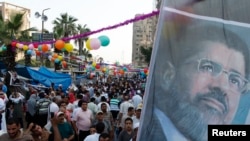The sentencing Tuesday of former Egyptian President Mohamed Morsi, the country’s first democratically elected leader, has raised concerns about the stability of a nation beset by turmoil since a popular uprising nearly four years ago.
An Egyptian court sentenced Morsi to 20 years in prison in connection with the killing of protesters outside the presidential palace in 2012, but the ousted Islamist leader escaped a possible death sentence. The criminal court also found 12 other Muslim Brotherhood leaders and supporters guilty of intimidation and violence, but not murder.
"We are concerned by these sentences,” said U.S. State Department spokeswoman Marie Harf. “All Egyptians regardless of political affiliation are entitled to equal and fair treatment before the law, including the full respect for their right to due process.”
She stopped short of suggesting the ruling was politically motivated and said the U.S. would comment further after reviewing the basis for the court’s decision.
The Egyptian military, with Abdel-Fattah el-Sissi as army chief, toppled Morsi in 2013 after millions took to the streets to accuse his government of abusing its power. Since then, the government of now-President Sissi has jailed tens of thousands of Muslim Brotherhood members and supporters. Hundreds have also been killed during protests.
“It’s a very extreme kind of situation,” said Michele Dunne, Middle East analyst with the Carnegie Endowment for International Peace. “You have a military-led government that sees itself in an existential struggle for power with an Islamist movement that they have largely put into prison. It’s a very ugly struggle.”
The potential for more instability will most likely grow as Egyptians face increased repression, a growing insurgency, a worsening economy and high unemployment, particularly among young people.
Dunne said the only question is “the degree to which repression and human rights abuses are fueling radicalization and instability in the country.”
Morsi’s prison sentence followed a string of mass death sentences that have sparked local and international condemnation. It also came less than a month after the U.S. announced its decision to resume suspended military aid to Egypt, saying the move was in the interest of U.S. national security.
The aid was suspended after Morsi’s 2013 ouster by the military.
Dunne said the U.S. should be careful about the public signal the decision to resume military aid may be sending. “To the Egyptian public, the only signal can be one of endorsing a government that is carrying out very strong political oppression and human rights abuses," she said.
State Department spokeswoman Jen Psaki said the U.S. has been “very clear” about the reason for the U.S. resumption of military assistance. “That’s in our national security interest, and we can both do that and express concerns at the same time," she said.




